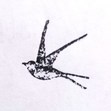Breaking the Block
It’s rather tricky to write when you can’t really think.
Writer’s block is an annoying and frequent inconvenience for any writer. For me, there’s always at least one big project on the go – which means that there’s always a narrative I need to get stuck into, every day without fail. And sometimes, for whatever reason, it just doesn’t flow. The right words won’t come, or none will come at all.
When you’re, say, on an eight and a bit-year streak of writing 500 words a day, this is something of a problem. I’ve got to get something down every day, block or no. So I have to try and find a way around it.
Just forcing your way through the issue doesn’t really work. Or at least it doesn’t work well; even if I can make myself get some words down they’re really not good ones. But as mentioned above, when you can’t even think your way through the next bit of story, just ‘writing anyway’ doesn’t cut it. Whether it’s just a slow day, or you’re ill, or, as in today’s case, you’re very tired after a long weekend of choir singing and carousing, getting words through the brain-fog is almost impossible.
Sometimes switching projects helps, but even then, you’re often still trying to wring creative juices out of a dry sponge/brain. And usually when I’m really stuck, it’s a universal thing: I’m not just struggling for specific ideas, I’m struggling for any ideas at all.
But I’ve got a trick. It’s served me very well in the past, for slaying the dragon that is writer’s block, for getting things flowing again. There is a way around the block. I’ve done it when I’m hungover, I’ve done it when I’m ill. And I’ll share it with you right now.
You are, in fact, already reading it.
If you find yourself unable to write, the only solution is to write about being unable to write. You can make it complex or simple, anything from a concise explanation to an overblown bit of theatre full of mad metaphors and exaggerations. Either approach has its merits – every bit of writing you do is practice, after all, and so however you decide to approach breaking your block, it’s going to be useful.
I’ve written about illness, I’ve written about rain. (I sit here now on a train back from Brighton in the pouring rain, in fact, which isn’t the most conducive environment for storytelling but it’ll do.) Whether it’s describing what’s directly ailing you or the environment around you, just get it down on paper (or chosen virtual equivalent). It might not be going in any novels any time soon, but just the act of articulating why you can’t articulate will let you break through.
If you’re a writer, you’re a storyteller. Take a moment to tell your own story, even if it’s boring.
Because now, having written 500 words about how I can’t write 500 words, I’m nicely warmed up. The block is broken, the thoughts are flowing – and I can get back to the good stuff and get writing properly.



